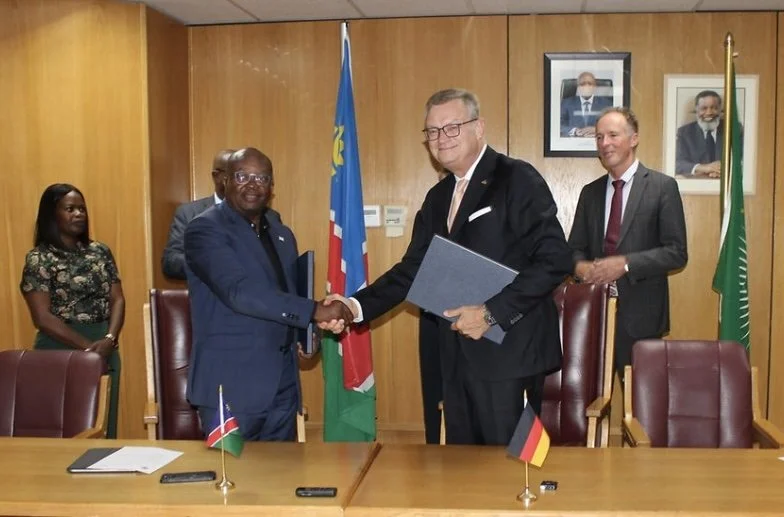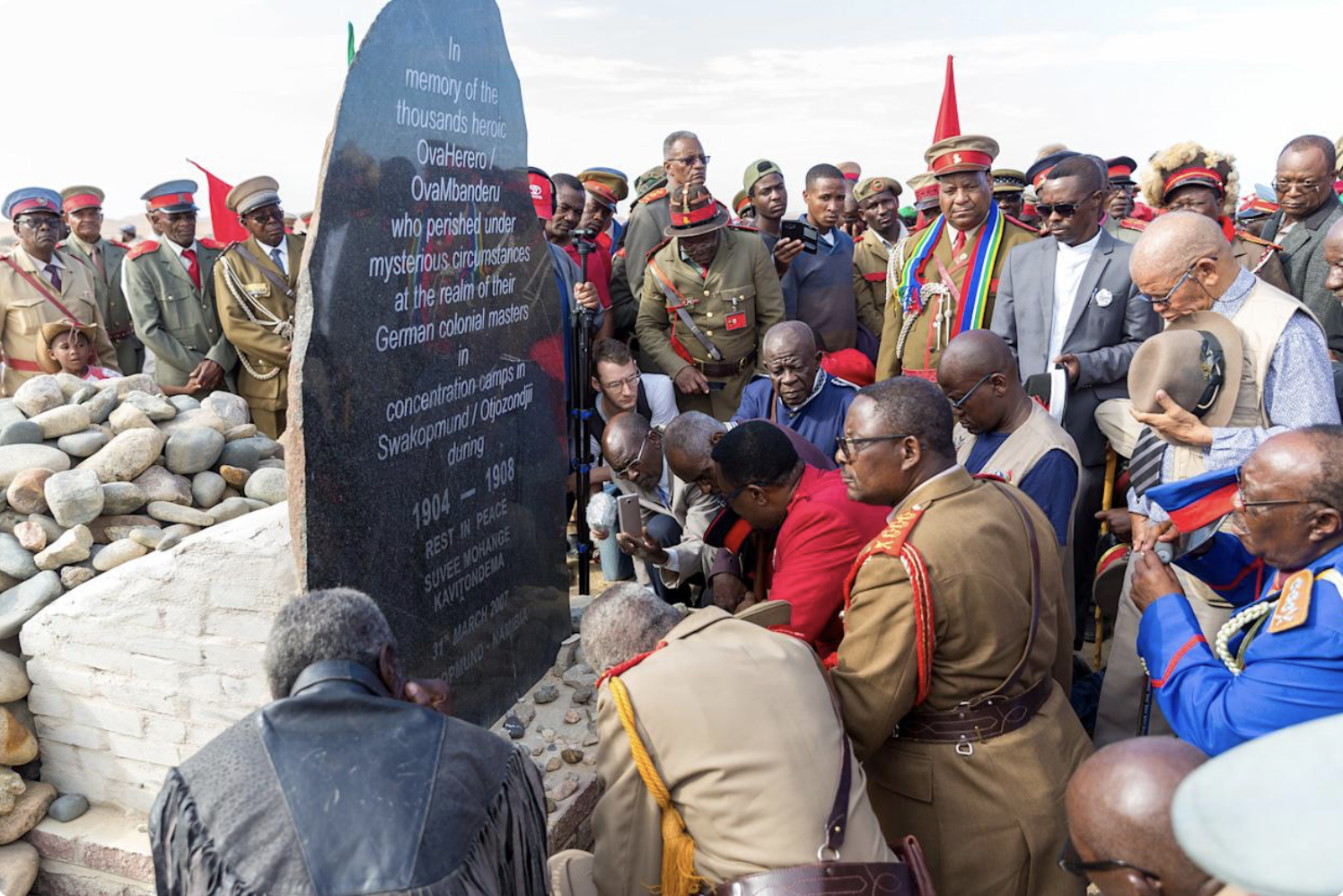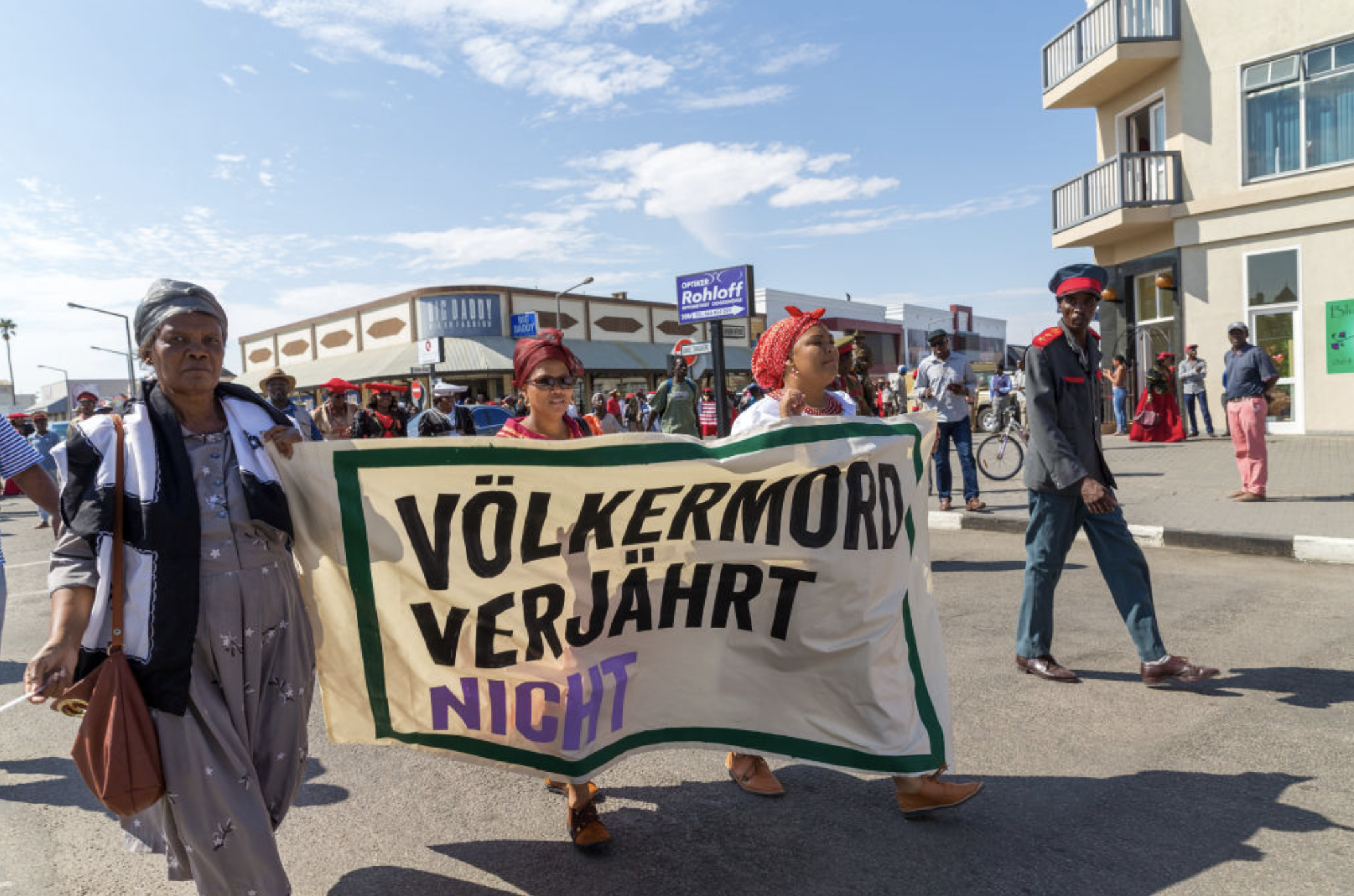Germany and Namibia Celebrate 35 Years of Development Aid—But What About Reparations?
The German Ambassador to Namibia shakes hands with the Director General of the National Planning Commission during a ceremony celebrating 35 years of German-Namibian development cooperation. (Photo: © German Embassy, Windhoek)
Last month, Germany and Namibia marked 35 years of development cooperation, celebrating over €1.5 billion in aid provided by Germany since Namibia gained independence in 1990 [1]. It was framed as a symbol of enduring friendship and shared commitment [2], but beneath the surface of diplomatic pleasantries, there has been criticism and growing discontent—particularly among Namibians still waiting for justice for colonial-era atrocities.
The celebration thus comes at a curious time, amid growing discontent over an unresolved agreement concerning Germany’s responsibility for the genocide of the Herero and Nama peoples during colonial rule. The agreement, initialled in 2021 after six years of negotiations, has yet to be signed or implemented, and many argue that it shouldn’t be, at least not in its current form [3].
A Deal Without Reparations
The declaration, meant to acknowledge Germany’s responsibility for the genocide committed between 1904 and 1908, was presented as a gesture of reconciliation. It included €1.1 billion in development assistance to Namibia over 30 years. However, it stopped short of establishing legal liability and was met with much criticism. The European Center for Constitutional and Human Rights called the deal a “lost opportunity” for Germany to meaningfully confront its colonial past and acknowledge the demands of affected communities [4].
Firstly, the declaration does not use the word reparations—arguably its most significant shortcoming. This omission has been central to the backlash [5]. Critics also argue that the €1.1 billion offer falls far short of what could be considered meaningful. The amount closely mirrors what Germany has already spent in development cooperation with Namibia over the past 35 years. It represents no significant shift from existing aid practices. When viewed against Germany’s own domestic public expenditures, the figure appears modest, reinforcing the perception that addressing colonial violence is not a political or financial priority [3].
The declaration also avoids any mention of land redistribution—a deeply symbolic and unresolved issue in Namibia. The Nama and Herero peoples were removed from the land by the German colonial regime through killings and displacement. After Namibia’s independence in 1990, the dominant political party, SWAPO, benefitted from an unfair post-independence land reform system that has not adequately corrected colonial injustices. For Herero and Nama, land is not just about economic capital but also about history, justice, and identity. Without addressing land, critics argue, any reconciliation effort will remain incomplete [3].
Moreover, the process through which the declaration was developed has been widely criticized. Indigenous Herero and Nama communities—those most directly affected by the genocide—were largely excluded from the negotiations [6]. Civil society organizations were also not meaningfully involved, prompting condemnation both domestically and internationally. As a result, critics contend that the two governments were “seeking forgiveness without listening to descendants” [7]. Reactions among affected communities were overwhelmingly negative, with many describing the deal as an insult [8]. UN Special Rapporteurs have since called on both governments to return to the negotiating table and ensure affected communities are properly included [5].
High-ranked chiefs and other members of the Herero and Nama communities gather around a monument in honor of the Ovaherero and Nama people that were victims of the genocide by German colonial forces at the Swakopmund Concentration Camp Memorial, in Swakopmund, Namibia. This was a part of the Reparation Walk 2019, an annual commemoration to honour the victims and to demand reparation from the German state. (Photo: © GETTY)
Germany’s Political Shift and the Current Stagnation
The declaration has remained in limbo since it was initialled in 2021. Namibia requested a renegotiation, echoing calls from UN Special Rapporteurs and civil society groups. But Germany has made it clear that the deal will not be renegotiated and recent political developments in Germany may make the prospect of moving forward even more uncertain [9].
In the wake of Germany’s recent regional elections, the political climate has shifted noticeably to the right. The far-right Alternative für Deutschland (AfD) party, which has gained traction across several federal states, opposes immigration, multiculturalism, and apologising for Germany’s colonial past [10]. While the declaration was originally drafted under a more centrist government, the current political mood is less conducive to addressing historical injustices.
This adds to a growing sense of frustration among those who have long advocated for an inclusive and accountable process. With no clear roadmap and little political will, reconciliation between the two countries appears more distant than before [3].
What Future for Reconciliation and Justice?
In the absence of formal reparations or a signed agreement, civil society actors and international observers continue to push for a process that centers the voices of those most affected.
In the meantime, Herero and Nama communities have turned to alternative ways to preserve memory: through song, dress, and other embodied practices [11, 12]. These were and continue to be coping mechanisms and avenues for social reconstruction in the absence of justice. But how can you reconcile with the past and the present when history and justice are being denied? When today’s inequalities due to legacies of colonial genocide remain unaddressed?
As Germany and Namibia reflect on their partnership over the past three decades, the question of how to reckon with their shared past remains unresolved. Diplomatic gestures and financial aid may signal goodwill, but without addressing the deeper wounds of colonial violence, reconciliation and decolonization risks becoming little more than rhetoric. Given the current political context, one can’t help but wonder—will reparations have to wait another 115 years?
Members of the Herero and Nama communities protest against their own government for greater reparations for the genocide committed against them. A banner reads "Völkermord verjährt nicht" ("Genocide does not expire"). (Photo: © GETTY)
Edited by Pilar Alejandra Paradiso and Tamiliniyaa Rangarajan
Endnotes
[1] Elao Aipanda, “Celebrating 35 Years of German-Namibian Development Cooperation – National Planning Commission,” npc.gov.na (National Planning Commission, March 7, 2025), https://www.npc.gov.na/celebrating-35-years-of-german-namibian-development-cooperation/.
[2] Mandisa Rasmeni, “Namibia and Germany Mark 35 Years of Strong Development Partnership,” Namibia Economist, March 10, 2025,
https://economist.com.na/95916/extra/namibia-and-germany-mark-35-years-of-strong-developm ent-partnership/.
[3] Henning Melber, “Germany and Reparations: The Reconciliation Agreement with Namibia,” The Round Table 111, no. 4 (July 4, 2022): 475–88,
https://doi.org/10.1080/00358533.2022.2105540.
[4] S Imani, K Theurer, and W Kaleck, “The ‘Reconciliation Agreement’ – a Lost Opportunity.” (European Center for Constitutional and Human Rights., 2021),
https://www.ecchr.eu/fileadmin/%20Hintergrundberichte/ECCHR_GER_NAM_Statement.pdf.
[5] Medico International, “‘We Mean Reparations!,’” Medico International, February 9, 2025, https://www.medico.de/en/we-mean-reparations-19962.
[6] Henning Melber, “Germany’s Genocide in Namibia: Deal between the Two Governments Falls Short of Delivering Justice,” The Conversation, January 7, 2025,
https://theconversation.com/germanys-genocide-in-namibia-deal-between-the-two-governments falls-short-of-delivering-justice-246719.
[7] R Hitchcock and M Kelly, “Reconciliation between Germany and Namibia: Towards Reparation of the First Genocide of the 20th Century.,” IWGIA News, October 12, 2021, https://www.iwgia.org/en/news/4538-reconciliation-between-germany-and-namibia-towards-repa ration- of-the-first-genocide-of-the-20th-century.html
[8] S Petersen and C Ngatjiheue, “German Genocide Offer ‘an Insult,’” The Namibian, May 28, 2021,
https://www.namibian.com.na/102012/read/German-genocide-o%EF%AC%80er-an-insult,.
[9] Africa Intelligence, “Namibia: Germany’s Billion-Euro Fund to Atone for Namibia Genocide Slow in Coming,” Africa Intelligence, March 6, 2025,
https://www.africaintelligence.com/southern-africa-and-islands/2025/03/06/germany-s-billion-eu ro-fund-to-atone-for-namibia-genocide-slow-in-coming.
[10] Al Jazeera, “Far-Right AfD and Socialist Left Win over Young Germans, Election Reveals,” Al Jazeera, February 25, 2025,
https://www.aljazeera.com/news/2025/2/25/how-afd-the-left-won-the-german-youth-vote.
[11] Kirsten Alnaes, “Living with the Past: The Songs of the Herero in Botswana,” Africa 59, no. 3 (July 1989): 267–99, https://doi.org/10.2307/1160229.
[12] Memory Biwa, “Afterlives of Genocide: Return of Human Bodies from Berlin to Windhoek, 2011,” in Memory and Genocide on What Remains and the Possibility of Representation, ed. Fazil Moradi, Ralph Buchenhorst, and Maria Six-Hohenbalken (London: Routledge, 2017), 91–106, https://doi.org/10.4324/9781315594897-7.



